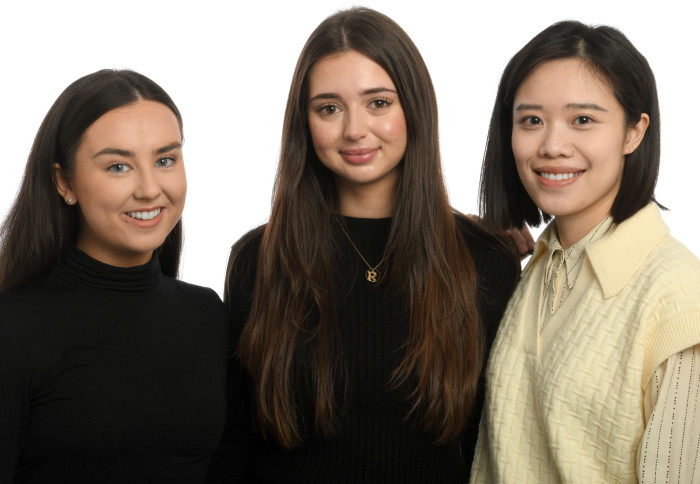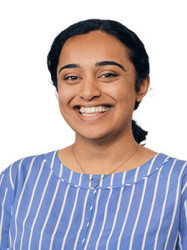

The first cohort of the newly launched Julia Anderson Training Programme have started placements at Imperial’s Institute of Global Health Innovation.
The programme, which is aimed at applicants with limited work experience in health, science, technology, or business management, enables trainees to develop professional and personal skills to boost their career prospects. The programme was developed in recognition of the barriers that many face when starting their career with limited experience in the workplace.
The application process is transparent and blinded for name, age, gender, and university to minimise potential recruitment bias. After the first application round, the scheme recruited three women as trainees.
As part of Women at Imperial week, we talked to the trainees about their hopes for the programme:
Yubing Du, Education Trainee
 Yubing works across both the communications and education team to help support IGHI's post-graduate programmes.
Yubing works across both the communications and education team to help support IGHI's post-graduate programmes.
Q: What made you apply to the Julia Anderson Training Programme?
YB: When I finished my master’s degree, I wasn’t sure what I wanted to do. I tried to find some entry level roles or internship programmes and that’s when I came across the Julia Anderson Training Programme. It sounded interesting and the role was specifically in education. I wanted to help contribute to better education for more people and return the help I received from my tutors and teachers who helped me while studying.
Q: How will this placement help you in the future?
YB: I think it will enhance my communication skills and these skills are important in whatever I do in the future. Also, I’ve always been interested in health care, so it's so valuable that I have the opportunity to work with researchers. I recently heard from IGHI’s digital health team about their work, and it’s been great to expand my knowledge about their research. Everyone at IGHI is incredibly supportive. I really enjoy the project I’m working on, and I can talk to different people to get insight into the MSc programmes to help the education team.
Q: Do you know what career you want to pursue in the future?
YB: After joining IGHI, I’m sure I want to stay in the health care industry – I’m not sure what exactly, but I want to help people achieve better health outcomes. People have different ways to achieve this goal but for me at IGHI, it’s about having an impact by helping students progress to higher education.
Paula Bradley, Digital Health Trainee
 Paula works with the digital health team to help evaluate tools that can be implemented in health care.
Paula works with the digital health team to help evaluate tools that can be implemented in health care.
Q: What made you apply to the Julia Anderson Training Programme?
PB: After my undergraduate degree I found it difficult to get into psychology roles. A lot of the research or Assistant Psychologist jobs require a lot of experience, which is difficult to have coming straight out of university. This programme is a good opportunity for people like me, without loads of experience, to get into the sector and gain experience. I thought it would be a great way to discover what I like and don’t like, and it could open my eyes to different fields.
Q: What are you looking for from the programme?
PB: I want to widen my connections with people in research but not only within Imperial – with clinicians too. I want to make those connections, learn to work in a team and collaborate and do the types of research I didn’t get to do in my degree. A lot of my degree was focused on quantitative data so learning about the qualitative side was another factor that made me apply.
"This programme is a good opportunity for people like me, without loads of experience, to get into the sector and gain experience." Paula Bradley Digital Health Trainee
Q: What advice would you give to someone thinking about applying?
PB: If you are struggling to gain experience to move forward your career, this is for you. It was a major reason I applied, and it helps you get your foot in the door and develop yourself at the same time. It can also help you if you are struggling with what career path to go down as you will work with such a variety of people in different roles, which makes you think about what best suits you. I haven’t seen anything else quite this and there should be more placements like this to allow people in the early stages of their career to gain experience. I also feel valuable at IGHI and like I’m a big part of the projects I’m working on, which is important when you go to a new job or place or work as a trainee.
Rreze Mujku, Big Data and Analytical Unit (BDAU) Trainee
 Rreze works alongside expert analysts in the IGHI's BDAU team to support technical projects.
Rreze works alongside expert analysts in the IGHI's BDAU team to support technical projects.
Q: What made you apply to the Julia Anderson Training Programme?
RM: When I graduated from university studying Economics, I asked myself – so what now? I started applying for everything from finance to general management but kept getting rejections. When I saw this opportunity, I thought ‘I like data’ and I was considering going into data management as I enjoyed it at university, so I applied. I wasn’t sure data management would be for me, but the programme gives me a chance to explore while also looking at other careers so that I can narrow down my options.
"The placement is meant for people without experience, so think of it as a stepping stone to whatever your career is going to be." Rreze Mujku BDAU Trainee
Q: What do you hope to gain from the programme?
RM: I will end up developing some practical skills through tasks that I’m involved in at the BDAU. Right now, I’m helping support the data management team with operations such as helping to complete the Secure Environment (SE) Annual User Renewal Process but also helping create the BDAU SE Newsletter. I’m also talking to researchers and learning about their data and what they are doing with it. At school I felt like research projects weren’t contributing to anything but in this placement, you’re helping projects for a reason.
Q: What are the benefits of applying and what would you say to someone who was thinking of applying?
RM: There are many opportunities to learn what you want through the internship and through contact with different staff members. It widens your awareness of other skills and gives you a taste of what people do, and maybe it will be something that interests you. The placement is meant for people without experience, so think of it as a stepping stone to whatever your career is going to be and view it as an opportunity to build yourself.
The Julia Anderson programme is open for the next round of applications. Apply by the 24 April. Opportunities are listed on the open training posts page.
Article text (excluding photos or graphics) © Imperial College London.
Photos and graphics subject to third party copyright used with permission or © Imperial College London.
Reporter

Meesha Patel
Faculty of Medicine Centre

Contact details
Tel: +44 (0)20 7594 7909
Email: meesha.patel17@imperial.ac.uk
Show all stories by this author


